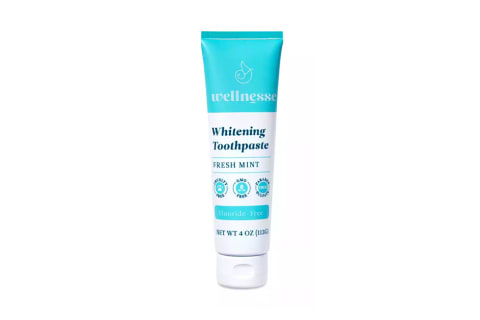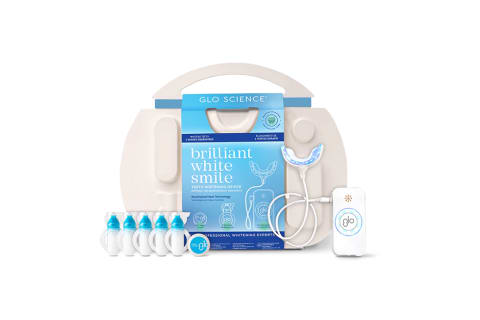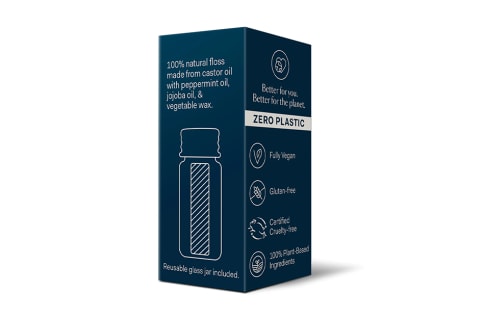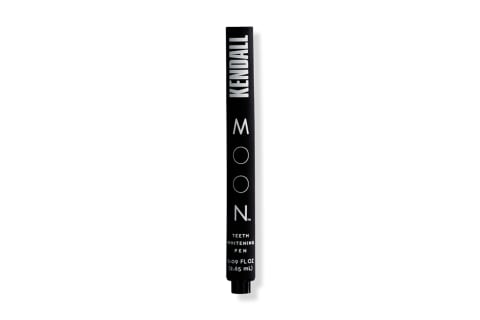Advertisement
How To Whiten Your Teeth At Home + What To Avoid, From Dentists

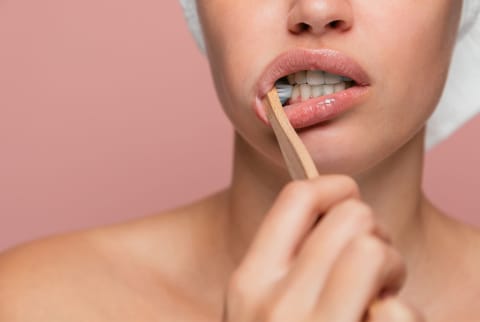
Some trends created on social media are relatively harmless. Makeup and hair care are two categories that are often deemed safe, for the most part. However, in recent years, oral care has become a new category filled with DIY remedies, 10-second hacks, and even at-home acid treatments.
Long story short: Oral care isn't something to play around with. When it comes to teeth whitening, the same is true. We asked dentists to give us the 101 on teeth whitening to help you navigate this buzzy topic without damaging your teeth. Here's what to do and what not to do, straight from experts.
How to naturally whiten teeth
If you want to skip risky at-home treatments and remedies, opt for one of the following methods.
Try oil pulling
Oil pulling is the act of swishing around coconut oil in the mouth to remove bacteria. This practice has been around for centuries, originating in India.
While oil pulling hasn't been studied in terms of teeth whitening treatment, anecdotal evidence does support the possibility. Plus, the overarching benefits for your oral health are worth adding the practice to your routine.
"Oil pulling may be beneficial for reducing the volume of bacteria in the mouth and thus improving gum health and preventing oral health issues like decay, bad breath, and gum disease," Levine explains.
While bacteria may not be all bad all the time, studies show they can lead to the yellowing of the teeth1 when out of balance. More specifically, a bacteria called Streptococcus mutants has been known to cause plaque and gingivitis. Luckily, swishing coconut oil in your mouth daily was shown to reduce this bacteria1, research shows.
So if your tooth discoloration is caused by a buildup of bacteria, then oil pulling might be a good option to try. Regardless, it's one low-lift (and affordable) oral care habit to add to your routine.
Use formulas with hydrogen peroxide
Frank notes that hydrogen peroxide has been proven effective for teeth whitening (an ingredient commonly found in whitestrips). This ingredient whitens the teeth by oxidizing and bleaching just the outer layer of the enamel, he explains.
However, this ingredient should be used with caution. You'll want to be sure to avoid anything stronger than 3% hydrogen peroxide, as more intense concentrations can result in tissue damage around the gums2, research shows.
What's more, don't use hydrogen peroxide whitening treatments too often. "It is generally recommended to use hydrogen peroxide for teeth whitening no more than once or twice per week and get a consultation from your oral health professionals," Levine says. So if you want to give hydrogen peroxide a try, see it as an occasional treatment.
In fact, some dentists recommend even less frequency. Functional Dentist Staci Whitman, DMD, warns that these may have long-term effects such as altering your microbiome.
“I generally do not recommend hydrogen peroxide frequently for bleaching—very infrequent is a maybe,” she says. “Hydrogen peroxide, if overused, can strip and damage the oral microbiome and should be used with caution.”
If you have sensitive gums or you’re hesitant to try this ingredient for whitening, just know there are plenty other alternatives.
Make a DIY baking soda paste
"Baking soda is a mild abrasive that can help to remove surface stains on the teeth and brighten their appearance," Levine says. "It can also help to neutralize acids in the mouth that can cause tooth discoloration and raise the pH of the mouth, which helps with a healthier bacterial balance and a healthier microbiome," he adds.
To use baking soda on the teeth, mix a small amount—no more than a tablespoon—with a bit of water in a small bowl to create a paste. Then, brush your teeth with the DIY paste. Or, you can look for toothpaste with baking soda in the formula.
The effectiveness of this method depends on how severe tooth stains and discoloration are. Some people may see results after just a few uses, while others might need to keep this practice in rotation for a bit longer.
Consider professional treatments
If you've tried DIY methods again and again with little to no success, it's worth investing in an at-home whitening kit if you can. Many kits, like the Glo Brilliant Advanced White Smile Device Kit developed by Levine, have gone through clinical studies and demonstrated significant results—something that's harder to achieve with DIY methods.
You can even opt for low-lift whitening pens that make teeth whitening as speedy as can be—here are 6 of the best options on the market, all backed by dentists.
If you have access to a dentist, meeting with them for a consultation for in-office treatments is also one option that's worth an investment. At the consultation, your dentist can develop a game plan specifically designed to whiten your teeth and address any sensitivities.
What causes yellow teeth & stains on teeth?
First things first, you'll want to write down a list of possible lifestyle habits that could be discoloring your teeth. For the most part, this falls into two categories: food and dental hygiene habits.
"Coffee, tea, red wine, sodas, and tobacco use are the most common culprits for yellowing teeth," dentist and founder of Walden Dental David Frank, DMD, tells mbg. But if you skip a basic oral care routine—including brushing and flossing, there's no way your teeth will stay perfectly white.
Other possible factors contributing to teeth discoloration include aging, genetics, and oral trauma, dentist and founder of oral care brand GLO Science Jonathan B. Levine, DMD, tells mbg.
In addition, some medications can cause tooth discoloration. "Antihistamines, antipsychotics, and blood pressure medications can cause dry mouth, which can lead to tooth decay and yellowing of the teeth," Levine says.
These factors can be harder to spot and control, so meet with your dentist if you think any of the above may apply to you. Regardless, start with the habits you can control.
Once you've evaluated what might be causing your teeth to yellow in the first place, do your best to either moderate or eliminate the habit if possible. If you're concerned about coffee (this one's arguably the most common), consider opting for a reusable straw to ensure the coffee doesn't touch your front teeth, or carry a travel-friendly toothbrush with you for a quick cleaning post-coffee.
Summary
Teeth whitening methods to avoid
There are a few natural methods floating around the internet that aren't going to whiten your teeth. In fact, some of these methods may do more harm than good, so let's go over what not to do.
Acidic formulas
One popular method is using acidic substances like lemon juice and apple cider vinegar—but neither of the two is dentist-approved.
"Recent studies have shown that ACV can cause more harm than good as these substances are highly acidic, much like soft drinks and fruit juices, which means it can directly cause breakdown of the enamel," Levine explains.
"The enamel layer protects the tooth and is the hardest substance in the human body and can be broken down with acids," he adds. So any sort of fruit juice or acidic rinse is a no-go—period. To manage bacteria in the mouth, opt for oil pulling instead.
Manual exfoliation
Do your best to skip manual teeth scraping as well. "At-home scalers will lead to potential damage to the enamel and soft tissue," dental hygienist Rebeca Rosario, director of operations at Wally Health (a New York City-based modern dental studio), previously told mbg.
If you're tempted to scrape your teeth because you feel plaque buildup, visit your dentist for proper teeth cleaning with professional-grade tools.
A note on brighter teeth
While wanting a whiter, brighter smile is perfectly normal—it’s important to remind yourself that oral aesthetics can come with many of the same modern hang-ups that we see with other beauty topics. The smiles you see on social media, in ads, or on celebrities are photoshopped, filtered, or even veneers.
“Hollywood smiles are often veneers, photoshopped, filtered and unrealistic and that many people have beautiful natural teeth,” says Whitman. “We are bombarded with what a ‘healthy smile' should be on social media and in the media and it is not realistic.”
Having a “perfect” smile is unrealistic, so try to not get hung up on unrealistic standards.
How to prevent yellow teeth
Once you've chosen your whitening method, it's essential to keep up your maintenance to prevent further staining. Keep the following in mind:
- Brush your teeth after consuming staining foods: These include coffee, tea, red wine, berries, soda, balsamic vinegar, and soy sauce.
- Keep up with oral care: At the bare minimum, brush your teeth twice a day and floss (may we recommend a sustainable option like this one from Better & Better?). Ask your dentist for the best product recommendations for your teeth.
- Don't skip dental visits: If you skip regular cleanings and consultations with your dentist, you're much more likely to experience teeth discoloration.
Products we recommend
FAQ
Can you whiten your teeth with lemon juice?
Short answer—you can't. Both lemon juice and apple cider vinegar are not going to whiten the teeth and will cause more harm than good. "These substances are highly acidic, much like soft drinks and fruit juices, which means it can directly cause breakdown of the enamel," Levine says.
How can you whiten your teeth overnight?
Teeth whitening does not happen instantaneously. If you want quick results, Levine recommends opting for a combination of hydrogen peroxide and a formulated peroxide adhesive with custom trays, as is found in many professional-grade treatments.
How can you whiten your teeth with baking soda?
To use baking soda on the teeth, mix a small amount—no more than a tablespoon—with a bit of water in a small bowl to create a paste. Then, brush your teeth with the DIY paste. Or you can look for toothpaste with baking soda in the formula, Levine says.
Meet the experts
- Dr. David Frank is a dentist and founder of Walden Dental.
- Jonathan B. Levine, DMD, is a dentist and founder of oral care brand GLO Science.
- Rebeca Rosario is a dental hygienist and director of operations at Wally Health (a New York City–based modern dental studio).
The takeaway
Whitening your teeth at home isn't something to take lightly or experiment with. Stick with these evidence- and expert-backed options and stay away from ingredients like lemon juice and apple cider vinegar. If you're ready to shop, this curated list of natural and nontoxic teeth whitening products will get you started as well as our favorite teeth whitening kits.
Editor's note: This article was originally published on December 21, 2022, and has been updated overtime to reflect the latest research and advancements in health and wellbeing. The current version of this article includes an expert review from a Doctor of Medicine in Dentistry, who updated the section on hydrogen peroxide to include cautions against using the ingredient too frequently. We've also added a section about the fallacies of a "perfect" smile.
